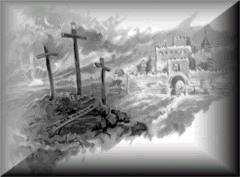Matthew, in chapter thirteen, verses thirty-four and thirty-five, made a direct reference to the first two verses of this Psalm when he said, (34) "All these things Jesus spoke to the multitude in parables; and without a parable He did not speak to them, (35) that it might be fulfilled which was spoken by the prophet, saying: 'I will open My mouth in parables; I will utter things which have been kept secret from the foundation of the world.'"
This Psalm was written by Asaph who was a musician who lived during the lifetimes of both David and Solomon.
The claim that Asaph wrote the Psalm is authenticated by the fact that the Psalm itself recounts the history of the people of God only down to the time of David.
Biblical commentators often struggle in their efforts to release Matthew from using merely accommodative language when he quotes this Psalm in the passage mentioned above.
One explanation is that Asaph was not only a musician but a prophet as well, and that he was here in his teaching showing how the Messiah would teach on earth.
But Matthew regarded these verses as a direct prediction of the nature of the teaching of Christ during his earthly ministry.
But it must be remembered that physical Israel was a type of spiritual Israel (the church) and here Asaph, as a prophet speaking in parables, is a type of Christ who would also speak in parables during his ministry upon the earth. (However, we shall see when we get to our discussion that the speaker of verses one and two is God and not Asaph. Asaph is only quoting God here, so there is no great problem.)
Therefore, Matthew correctly attributes the first two verses of this Psalm as a prediction of the kind of teaching that would be done by the Messiah.
The Holy Spirit inspired Asaph to write the Psalm, and the Holy Spirit inspired Matthew to quote from it and ascribe the language to the Messiah. We have no doubt that the Holy Spirit knows what is predictive prophecy of the Old Testament, and what is not, and that he has the right to state such in the New Testament, or anywhere else he so pleases.
With this brief background before us, let us now turn to the portion of scripture we will study and begin by reading it. Psalms 78:1-2,(1) "Give ear, O my people, my law; Incline your ears to the words of my mouth. (2) I will open my mouth in a parable; I will utter dark sayings of old. . . ."


 Home
Home Current Issue
Current Issue Archives
Archives Bookstore
Bookstore Printshop
Printshop
 Plan of Salvation
Plan of Salvation Correspondence Course
Correspondence Course Daily Bible Reading
Daily Bible Reading
 Contact Us
Contact Us churches of Christ
churches of Christ Lauds
Lauds Links
Links

